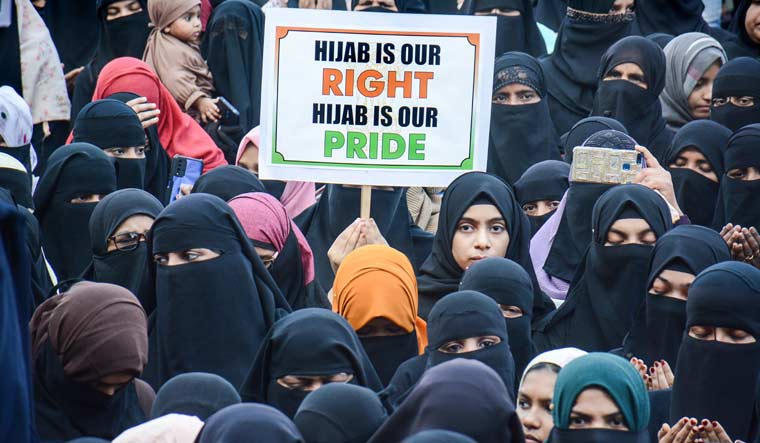Courts Not Equipped To Decide Essentiality Of Hijab: Petitioners To SC
Sep 14, 2022 | Pratirodh Bureau
FILE PHOTO: Muslim students protest against the hijab ban in Karnataka colleges (PTI)
Petitioners on Wednesday told the Supreme Court that according to their religious text, wearing of hijab was ‘farz’ (duty) and the courts were not equipped to determine its essentiality.
The apex court was hearing submissions on the fifth day against the Karnataka High Court’s judgement of March 15 upholding the ban on hijab in pre-university colleges.
Senior advocate Rajeev Dhavan, representing some petitioners, submitted before a bench comprising Justices Hemant Gupta and Sudhanshu Dhulia that once it was shown that wearing a hijab is a bona fide practice then it was permitted, while citing the apex court’s decision in the Bijoe Emmanuel case. Dhavan said that the conclusion of the Karnataka High Court was puzzling, as it said hijab was not mandatory due to the absence of prescription of penalties.
The bench queried that Dhavan’s argument was that the courts were not equipped to decide the matter, and if a dispute arises, which forum will decide it? Dhavan asked whether the dispute was that hijab was an essential practice? He added that hijab was worn all over the country, and as long as it was bona fide and prevalent, the practice must be allowed and there was no need to refer to the religious text.
Dhavan argued that according to the tenets of the faith, if something has been followed, it was allowed, and if it was bona fide, there was no need to go back to the text. Also, if a belief of a community was proved, then a judge was bound to accept that belief, instead of sitting on judgment on that belief, he added.
Citing the Kerala High Court decision, he added that the analysis of the Quranic injunctions and the Hadiths would show that it was a ‘farz’ to cover the head.
The bench queried, what was the basis of saying it was a ‘farz’? Justice Gupta told Dhavan, “You want us not to do what the Kerala High Court has done?”
He replied that, “If one were to interpret the text then the answer to it is ‘farz’, and if it is a ritual that is prevalent, and is bona fide, your lordships will allow (it).” Dhavan added that the rationale in the Kerala case given by the Board was that it was a measure to prevent malpractices in the All India Pre Medical Test (AIPMT) in 2016, but in the Karnataka case, there was no rationale given.
He said further that since hijab was permitted across the board in public places, what was the basis of saying hijab can’t be allowed in a classroom and was opposed to public order? Concluding his argument, Dhavan said there was no foundation in the government order against hijab. It violates Article 14 and 15, and this was not permissible in the Constitution.
